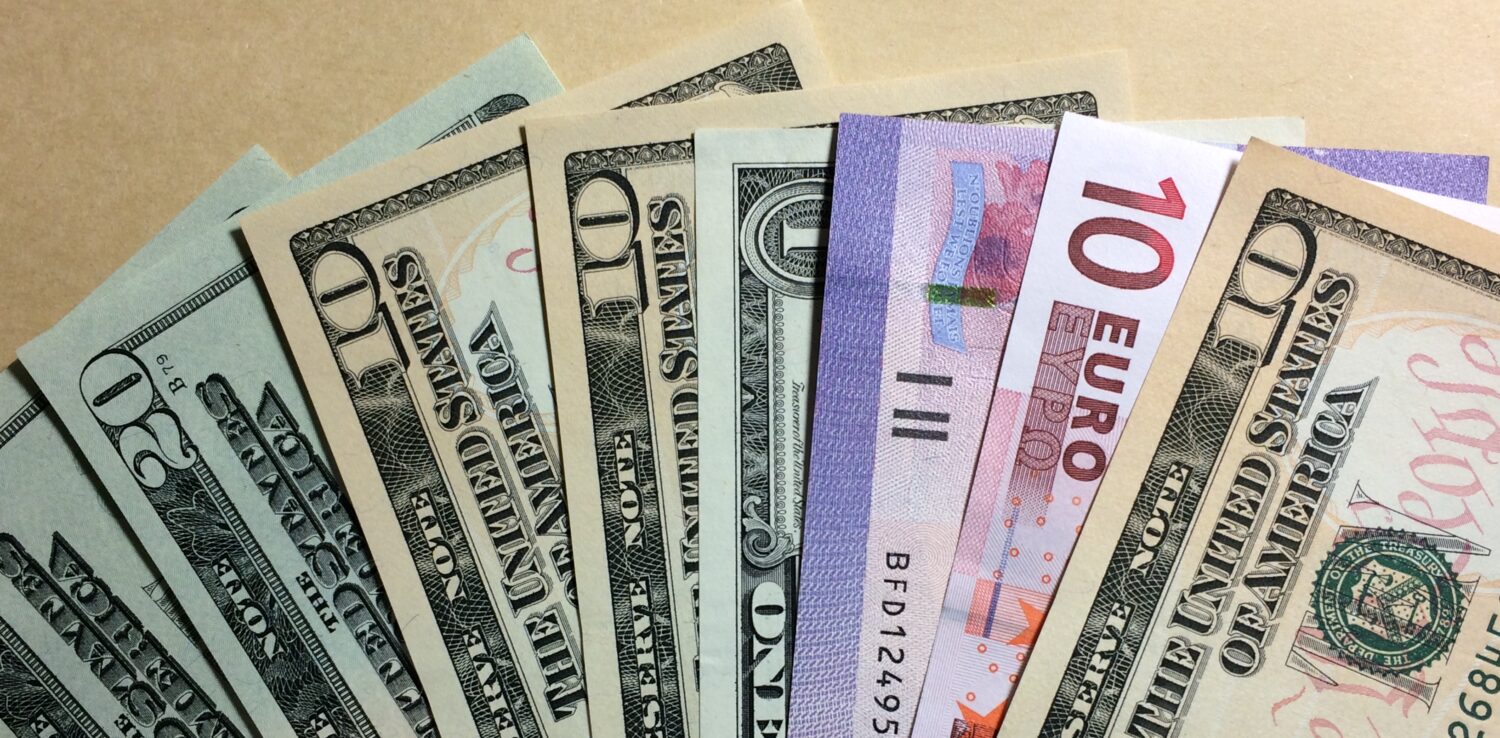General
Paasport
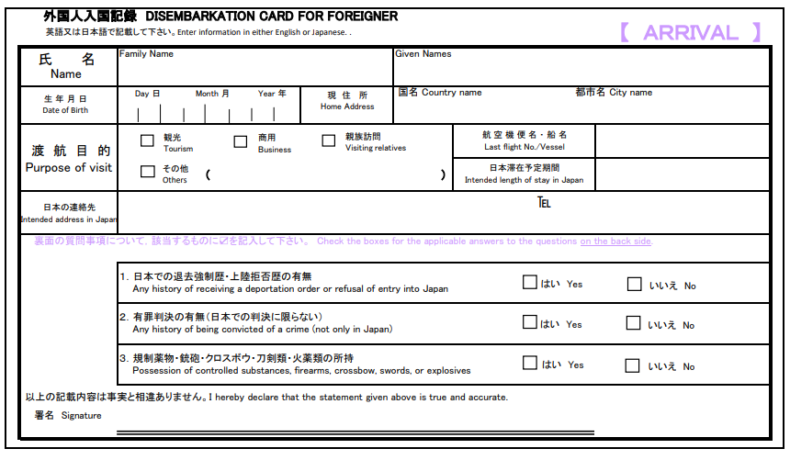
Of course, you need a passport.
If you don’t have it, please contact the following agency in the United States.
If you aren’t a US citizen, contact your local Foreign administration office.
This is a card you need to fill in before entering Japan.
Normally this document will be handed out to you from a flight attendant when you are abroad.
Card (2) will be attached to your passport and used when you will leave Japan.
See more detail “Entry to Japan“
National Holidays
You need to check your schedule.
If you hit these holidays in Japan, there are many events in Japan. Please enjoy them.
There are a lot of places to satisfy your requirement.
Sightseeing, shopping, museums, Music.
All department stores and Public spaces are open from 10:00 to 7:00
even National Holiday (except New Year’s Day).
Many companies take off from Dec.29 to Jan 3 at least.
The service industry (restaurant, museum) takes off Jan 1 and 2. Recently the situation has a little bit changed.
Super Markets are open on even Jan 1st.
These rules vary. Please check it at the concierge at your hotel or the appropriate shop website.
Bon is another peak period not good to visit Japan.
It is around from Aug 10 to Aug 15.
We can expect the trains for long-distance are fully crowded.
Here is a calendar for next year for planners to Japan next year.
2026 (this year)
| January 1: | New Year’s Day (National Holiday) |
| January 9: | Coming of Age Day (National Holiday) |
| February 11: | National Foundation Day (National Holiday) |
| March 20: | Vernal Equinox Day (National Holiday) |
| April 29: | Showa Day (National Holiday) |
| May 3: | Constitution Day (National Holiday) |
| May 4 : | Green Day(National Holiday) |
| May 5 : | Children’s Day (National Holiday) |
| July 17: | Marine Day (National Holiday) |
| August 10: | Mountain Day (National Holiday) |
| September 18: | Respect-for-the-Aged Day (National Holiday) |
| September 23 : | Autumnal Equinox Day (National Holiday) |
| October 9 : | Health-Sports Day (National Holiday) |
| November 3: | Culture Day (National Holiday) |
| November 23: | Labor Thanksgiving Day (National Holiday) |
| December 23: | Emperor’s Birthday (National Holiday) |
2025 (last Year)
| January 1: | New Year’s Day (National Holiday) |
| January 13: | Coming of Age Day (National Holiday) |
| February 11: | National Foundation Day (National Holiday) |
| February 23: | Emperor’s Birthday (National Holiday) |
| February 24: | Emperor’s Birthday (National Holiday) (*Observed) |
| March 20: | Vernal Equinox Day (National Holiday) |
| April 29: | Showa Day (National Holiday) |
| May 3: | Constitution Day (National Holiday) |
| May 4 : | Green Day(National Holiday) |
| May 5 : | Children’s Day (National Holiday) |
| May 6 : | Children’s Day (National Holiday)(*Observed) |
| July 21: | Marine Day (National Holiday) |
| August 11: | Mountain Day (National Holiday) |
| September 15: | Respect-for-the-Aged Day (National Holiday) |
| September 23 : | Autumnal Equinox Day (National Holiday) |
| October 13 : | Health-Sports Day (National Holiday) |
| November 3: | Culture Day (National Holiday) |
| November 23: | Labor Thanksgiving Day (National Holiday) |
| November 23: | Labor Thanksgiving Day (National Holiday)(*Observed) |
*2/12, 5/6, 8/12, 9/23, 11/4 are National holiday observance which are maked up for overlap of holiday on Sunday.
Temperature
Temperature and weather are the most important items to check before travelling.
| City | 1 | 2 | 3 | 4 | 5 | 6 | 7 | 8 | 9 | 10 | 11 | 12 |
|---|---|---|---|---|---|---|---|---|---|---|---|---|
| Tokyo | 5.2 | 5.6 | 8.5 | 14.1 | 18.6 | 21.7 | 25.2 | 27.1 | 23.2 | 17.6 | 12.6 | 7.9 |
| Kyoto | 4.0 | 4.5 | 7.6 | 13.9 | 18.7 | 22.4 | 26.5 | 27.7 | 23.4 | 17.1 | 11.5 | 6.5 |
| Sapporo | -4.6 | -4.0 | -0.1 | 6.4 | 12.0 | 16.1 | 20.2 | 21.7 | 17.2 | 10.8 | 4.3 | -1.4 |
The unit is Centigrade Degree.
Time Difference
In Japan, we have one standard. And it is called Japan Standard time.
And no “daylight saving” time. Today is Nov 17 2018 in Japan.
And it is 7:55 P.M., Japan time.
It is different from yours as you find it.
You need to pay attention always whenever you call home or office from Japan.
Time Difference international
This table shows the Time Difference from Japan to your country.
In the case of Boston, it says -14 hours.
In Japan Noon =>
In Boston Noon -14 becomes
10 o’clock in the evening on the previous night.
| Area | Country/ City | Time_ Difference |
|---|---|---|
| Asia | China | -1 |
| Asia | Hong_Kong | -1 |
| Asia | India | -3:30 |
| Asia | Indonesia | -1 |
| Asia | Korea | 0 |
| Asia | Malaysia | -1 |
| Asia | Pakistan | -4 |
| Asia | Philippines | -1 |
| Asia | Singapore | -1 |
| Asia | Taiwan | -1 |
| Asia | Thailand | -2 |
| America | Brazil | -12 |
| America | Canada(Toronto) | -14 |
| America | Canada(Vancouver) | -17 |
| America | USA(Atlanta) | -14 |
| America | USA(Boston) | -14 |
| America | USA(Dallas) | -15 |
| America | USA(Denver) | -16 |
| America | USA(Los Angels) | -17 |
| America | USA(New York) | -14 |
| America | USA(Washington) | -14 |
| Europe | Belgium | -8 |
| Europe | France | -8 |
| Europe | Germany | -8 |
| Europe | Italy | -8 |
| Europe | Netherlands | -8 |
| Europe | Spain | -8 |
| Europe | Switzerland | -8 |
| Europe | United Kingdom | -9 |
| Oceanic | Australia(Canberra) | -1 |
| Oceanic | New Zealand | +3 |
| Oceanic | Hawaii | -19 |
Electric Voltage
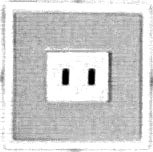
All area in Japan, Electric Voltage is 100 Volt.
Eastern Area of Japan
100 Volt 50 Hertz
Western Area of Japan
100 Volt 60 Hertz
If your country’s voltage is 120 Volt, your hairdryer can be used
in both areas but less power.
If you have a dryer with a voltage change switch(115 <-> 230),
it is what you need to bring.
Water
All tap water is safe to drink in Tokyo, Osaka, Yokohama and everywhere in Japan.
Restaurants serve you a glass of water or a cup of tea promptly.
This is free of charge and safe.
Surprisingly, the Bureau of Waterworks of Tokyo Metropolitan Government sells bottled water of tap water. in plastic bottles.
Some of the Chinese restaurants charge you for tea.
Radio in Japan
If you want to listen to the English Radio station,
AFN Pacific (American Forces Network) AM 810 k Hz.
This station is for US Army/Navy around the Tokyo area.
Now you can listen to this station on your smartphone.
Android Apps
iTunes Apps
![InterFM897 : インターFM897 [ 89.7MHz TOKYO ]](https://www.interfm.co.jp/image/logo_inter-h.svg)
InterFM FM 89.7 M Hz.
International FM station for international people has changed the frequency.
Kind of public Radio for foreign people various news, information and music
with various language.
Television in Japan
– NHK (Nihon Hoso Kyoukai) is the best source to find what’s going on in Japan.
The broadcasting area is nationwide.
The channel number is normally 01 or 02.
This news program is also available on the WEB site.

– CNN is the second choice for you to get the right information. You can watch it at a hotel and various place
Also, podcasting is available.
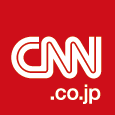
Telephone
A telephone call to your country costs a lot.
Why don’t you bring a card which is issued by your telephone company with you.
If you are from US, AT&T or MCI card will be good to carry.
ATT 1-800-222-0400
MCI 1-800-444-4141
You just call an operator and tell them you want to have an international calling card.
They will send the telephone card and let your know the special access phone number to be able to make a direct call to your home country.
In the case of AT&T, it is 0039-111
If you are staying in a hotel, dial ‘0’ to connect it to an outside line.
You have another option to save money to call out.
ATT Pre-paid card
You can call from payphones, home phones, office phones, mobile phones and hotel phones using AT&T pre-paid card.
Same rates 24 hours a day, 7 days a week
Why don’t you call AT&T before your departure?
Prepaid cellphone
Prepaid cell phones are available for travellers to Japan.
It would be better to make an advanced reservation.
Public phone
The public phone requires coin, 10 Yen, 100 Yen, or a telephone card, prepaid plastic money – only good for the telephone.
Some telephone can only accept a telephone card.
Recently so many cell phones are used in Japan and the number of public phones is decreasing dramatically.
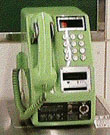
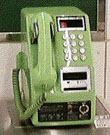
International Call

Correct Call for Domestic
Dial 106
Dial Information in English by Nippon Telephone & Telegram
0120-364-463
Monday – Friday
From 9 a.m. to 5 p.m.
Interpreter Service
If you have trouble on phone, you can ask AT&T to help you as an interpreter.
Dial 0031-11-2522
It costs you 4.5 Dollars/minute.
Internet service
There are many free Internet access points in Japan.
Still, you feel stressed a lot.
If you are a real network user, please consider renting a wifi router.
Here is a guide to get a prepaid SIM.
Mail and Post offices
You may want to send a picture card or a letter to your family. You can buy postcards at any gift shop then you need stamps. International postage is complicated. The postage to your country varies from country to country. It is better to check the charge at the WEB site of Japan Post.
Here is the explanation of international postage.
Check Japan Post Office
Accomodations (Hotels etc.)
There are several types of Accommodation facilities in Japan.
- Hotels
- Business Hotel
- Ryokan(Japanese Inn)
- Pension
- Minsyuku
- Youth Hostel
You can select your favourite type of facilities when you make a reservation.
When you make a reservation, you had better to check all facilities in your room.
See the following chart for your reference:
There is no definition of each facility and equipment. The following chart is my guts feeling for your reference.
Accommodation comparison chart
| Service | City Hotel | Business Hotel | Kanko Hotel | Ryokan | Pension | Minshuku | Youth Hostel |
| Price | 10k – 40k | 5k – 10k | 10k – 50k | 10k – 100k | 6k- 15k | 5k – 8k | 3k – 4k |
| Target guest | Everybody | For Japanese Businessman | Everybody | Everybody | Family or Couple | Family | Students |
| Location | Big city | Big city – small city | Sightseeing spot | Sightseeing spot | Sightseeing spot | Sightseeing spot | Sightseeing spot |
| Outside call from room | Yes | Yes | Yes | Yes | ? | No | No |
| Dinner | Not incl. | Not incl. | Included | Included | Included | Included | Not incl. |
| Breakfast | Not incl. | Not incl. | Included | Included | Included | Included | Not incl. |
| Air conditioning | Yes | Yes | Yes | Yes | ? | N | ? |
| Floor | Carpet | Floor | Tatami | Tatami | Floor | Tatami | Floor |
| Restaurant | Several | one | Several | one | No | No | No |
| Bed type | Bed | Bed | Bed or Futon | Futon or Bed | Bed or Futon | Futon | Bed |
| Bathroom | In room | In room | In room | In room | ? | Shared | Shared |
| Shower | In room | In room | In room | In room | ? | Shared | Shared |
| Toilet | In room | In room | In room | ? | ? | Shared | Shared |
| Furniture Table and chair | Equipped | Equipped | Lower table and Zabuton | Lower table and Zabuton | No | Lower table and Zabuton | No |
| Shoes | No need to take off | No need to take off | Take off | Take off | Take off | Take off | Take off |
| Prepared Nightware | Pajamas | Pajamas | Yukata | Yukata | Yukata | Yukata | No |
| Amenity set | Yes | Yes | Yes | Yes | Yes | No | No |
| Cleaning service | Yes | Yes | Yes | Yes | No | No | No |
Hotel
You can enjoy your stay with a comfortable feeling because everything is similar to the Continental level hotels.
All clerks can speak English and you don’t feel any difference from English native hotel.
Following is the example of famous hotel chains in Japan.
Mariott Hotel
Sheraton Hotels
Marriott Hotels
Ritz Carllton
Westin
Inter Continental
Four seasons hotel and resort
Starwoods Hotel and resort
Business Hotel
Business hotel (hotels for the lower budget businessman)
Someone call the bath equipment in the business hotel a “Yellow submarine”
You know the submarine equipment is well designed compactly.
The size of the room starts from 100 sq feet or 6 m x m
Larger cities than middle size have business hotels.
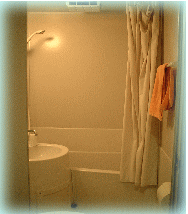
Space is so limited.
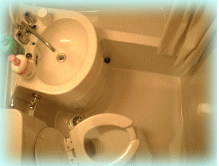
You can find the best technology to put all utilities in small space.
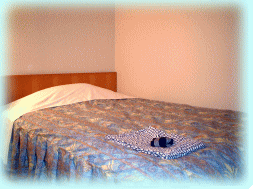
Yukata is ready to wear as a bathrobe for you.
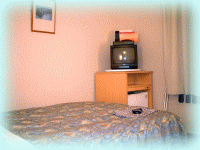
TV isn’t always free.
You might need to pay 100Yen per hour.
A special TV watching card may be needed.
Try switch on!
Kanako hotel
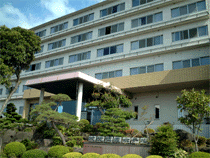
Many sightseeing areas have Kanko Hotels. Here Kanko means sightseeing.
Nice View
- mountains
- lakes
- ocean cliffs
- hot spring etc.
Normally these hotels supply a good view from the window of your room or good foods or good amenity facilities like hot springs and Roten buro ie. open public bath
MInshuku
Minshuku follows the Youth hostel price-wise.
A family operates a lodging using their house.
It is tough to find an English speaker at a Minsyuku.
If you want to stay in a Minsyuku, you had better to know some Katakoto Japanese (simple communication level Japanese).
The bath is shared with all guests so you have to use the bath with other guests.
Some Minshukus have coin-operated air-conditioners. They require 100 Yen for one hour of operation.
No bed is available.
A room has a Tatami mattress, typical Japanese flooring covered with straws mattresses.
Here Tatami mattress is a woven rush.
It is very popular in Japanese houses.
Lower budget Minsyuku have no air-conditioners
Meals are served in the dining room which has Tatami mattresses flooring.
You need to knee and sit down on Zabuton cushions.
The restroom is shared with other guests also.
A room has 6-10 Tatami mattresses, a low table and 4-6 Zabuton mattresses.
When you are going to sleep, you need to pull the Futon from the closet and arrange it to fit into your room.
Pension (private owned B and B)
Also, Pension is operated by a family but the house is normally rebuilt to accept guests.
There are various types of rooms.
– Two beds
– Three beds
– Two Futon
– Three Futon
You can specify the type of room like above in addition to the selection of bath and powder room.
The meal is served in the dining room.
An owner of a Pension might be able to speak English. You had better ask it when you make a reservation.
Japanese Inn
Typical Japanese inn
The facility of Ryokan is similar to Kanko Hotel but they have more heritage
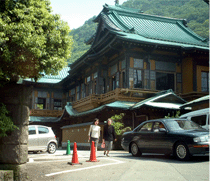
Ryokan is a typical Japanese inn.
When you get through the entrance of a ryokan, you will be welcomed by inlined employees bawing deeply and saying “Ira-shaimase – it means welcome to us”.
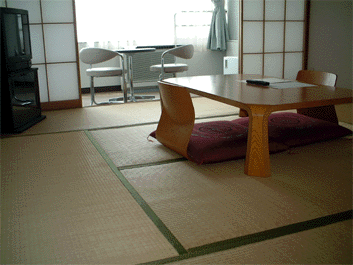
The facility of Ryokan is similar to Kanko Hotel but they have more heritage
Tatami mattress room and a set of tables and chairs are typical arrangements in a ryokan.
A room in the best class has a bathroom and powder room.
Almost all ryokans have a public bath.
Youth Hostel
Youth hostel is the cheapest facility of lodging.
The manner of using youth hostel is universal.
There are 350 youth hostels in various locations in Japan.
You can make a reservation at Youth Hostel in Japan from an office in your country.
The cost of a youth hostel is around 3000 Yen and around 4500 Yen if two meals are included.
Bathing in Japan
Sento (publici bath)
It used to be a public bath in town. The bathtub/shower in the house wasn’t so popular in Japan until 20 years. At least one or two Sentos were in a town and it was the community place for people. The number of Sento decreased dramatically by increasing of home shower equipment. The Sentos are changing their style from public baths to Hot Spring facilities to survive.
The long Chimney is a symbol of the Sento facility. There are two entrances for men and women in front of Sento. Take off your shoes and put your shoes into a shoe locker. A person at the entrance is called “Bandai” requests you to pay a fee.
Around 300 yen is a fee to take a bath. Then you will find open free space that is supposed to take your clothes off. There are shelves and lockers for your clothes.
You can put your clothes into a locker and keep the key on your wrist to the bathroom. Take a towel with you to wash your body.
The second room has one or two bath tabs and faucets. One thing you have to notice is not to wash your body in the tub. We will share some water with other people. The bathtub is to dip your body for soaking. Put a towel on your head to avoid putting it into the bathtub sanitarily. You wash your body in front of the faucet then rinse.
Hot springs (Onsen)

The system is a public bath, the same as sento. Onsen means hot spring. The area where there are many hot springs, has many ryokans, a traditional Japanese inn, and they have bathrooms in each ryokan. Also open-air baths are available in various hot springs locations.
Onsens are normally located in a rural place.
If the place you are going to has Roten buro (low ten boo low), “open-air bath”, you will really enjoy it in the open air.
Rotenburo faces the mountainscape like Mt. Fuji, waterscape etc. Some onsens aren’t separated for men and women in the mountain area. You need to check it before entering.
Roten Buro
You could feel relaxing with
open -air
nice view
The way to take a shower at a friend house is explained on the “Culture” page.
Vending machines

Japan is a country of vending machines.
It was told that one-third of all vending machines in the world locate in Japan.
You can find vending machines very easily, tobacco,
soft drinks, beer, tissues, magazines, etc.
Alcoholic beverages are sold only from morning to 10PM by vending machines.
Time varies by prefecture.
This is the regulation to protect younger people
from drinking.
5 Yen and 1 Yen coins can’t be used in all vending machines.
Also, vending machines are available in many hotels.
If your hotel doesn’t have room service, it should have vending machines somewhere.
You can buy any beverage of a variety of selections, juice, green tea, oolong tea, beer, etc.
